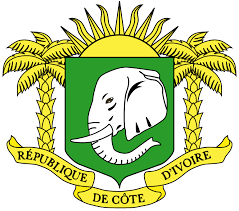Cote D'ivoire
Cote D'ivoire Home

A virtual guide to Côte d'Ivoire (also known as Ivory Coast), a tropical country in southern West Africa on the Gulf of Guinea (North Atlantic Ocean), bordered in the north by Mali and Burkina Faso, in the west by Liberia and Guinea, and in the east by Ghana.
Côte d'Ivoire has a population of 22.7 million inhabitants (in 2015). The capital city is Yamoussoukro. The largest city and the de facto capital is Abidjan. Spoken languages are French (official); and languages of five principal language groups, the Diula (Dioula), Baule (Baoulé), Dan, Anyin and Senari. About 40% of the population are Muslims, 34% are Christians, and 25% practise traditional (animist) religions.
Background:
Close ties to France since independence in 1960, the development of cocoa production for export, and foreign investment made Cote d'Ivoire one of the most prosperous of the West African states but did not protect it from political turmoil. In December 1999, a military coup - the first ever in Cote d'Ivoire's history - overthrew the government. Junta leader Robert GUEI blatantly rigged elections held in late 2000 and declared himself the winner. Popular protest forced him to step aside and brought Laurent GBAGBO into power.
Ivorian dissidents and disaffected members of the military launched a failed coup attempt in September 2002. Rebel forces claimed the northern half of the country, and in January 2003 were granted ministerial positions in a unity government under the auspices of the Linas-Marcoussis Peace Accord.
President GBAGBO and rebel forces resumed implementation of the peace accord in December 2003 after a three-month stalemate, but issues that sparked the civil war, such as land reform and grounds for citizenship, remained unresolved. In March 2007 President GBAGBO and former New Force rebel leader Guillaume SORO signed the Ouagadougou Political Agreement. As a result of the agreement, SORO joined GBAGBO's government as Prime Minister and the two agreed to reunite the country by dismantling the zone of confidence separating North from South, integrating rebel forces into the national armed forces, and hold elections. Several thousand French and UN troops remain in Cote d'Ivoire to help the parties implement their commitments and to support the peace process.
Sign in to add your comment.
Suggested Pages
Official Name:
Republic of Cote d'Ivoire
Short form:Cote d'Ivoire (or Ivory Coast)
ISO Country Code: ci, CIV
Time:
Local Time = UTC +0h
Country Calling Code: +225
Capital City: Yamoussoukro,
Abidjan (the economic capital and de facto political capital)
Other Cities: Bouaké, Daloa, Gagnoa, Korhogo, Man, San Pedro.
Government:
Type: Republic.
Independence: 7 August 1960.
Geography:
Location: Western Africa, bordering the North Atlantic Ocean, between Ghana and Liberia.
Area: 322,500 km² (124 500 sq. mi.)
Terrain: Forested, undulating, hilly in the west.
Climate: Tropical, semiarid in the far north.
